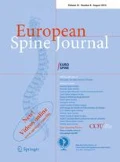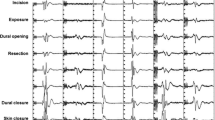Abstract
In spite of advancements in neuro-imaging and microsurgical techniques, surgery for intramedullary spinal cord tumors (ISCT) remains a challenging task. The rationale for using intraoperative neurophysiological monitoring (IOM) is in keeping with the goal of maximizing tumor resection and minimizing neurological morbidity. For many years, before the advent of motor evoked potentials (MEPs), only somatosensory evoked potentials (SEPs) were monitored. However, SEPs are not aimed to reflect the functional integrity of motor pathways and, nowadays, the combined used of SEPs and MEPs in ISCT surgery is almost mandatory because of the possibility to selectively injury either the somatosensory or the motor pathways. This paper is aimed to review our perspective in the field of IOM during ISCT surgery and to discuss it in the light of other intraoperative neurophysiologic strategies that have recently appeared in the literature with regards to ISCT surgery. Besides standard cortical SEP monitoring after peripheral stimulation, both muscle (mMEPs) and epidural MEPs (D-wave) are monitored after transcranial electrical stimulation (TES). Given the dorsal approach to the spinal cord, SEPs must be monitored continuously during the incision of the dorsal midline. When the surgeon starts to work on the cleavage plane between tumor and spinal cord, attention must be paid to MEPs. During tumor removal, we alternatively monitor D-wave and mMEPs, sustaining the stimulation during the most critical steps of the procedure. D-waves, obtained through a single pulse TES technique, allow a semi-quantitative assessment of the functional integrity of the cortico-spinal tracts and represent the strongest predictor of motor outcome. Whenever evoked potentials deteriorate, temporarily stop surgery, warm saline irrigation and improved blood perfusion have proved useful for promoting recovery, Most of intraoperative neurophysiological derangements are reversible and therefore IOM is able to prevent more than merely predict neurological injury. In our opinion combining mMEPs and D-wave monitoring, when available, is the gold standard for ISCT surgery because it supports a more aggressive surgery in the attempt to achieve a complete tumor removal. If quantitative (threshold or waveform dependent) mMEPs criteria only are used to stop surgery, this likely impacts unfavorably on the rate of tumor removal.


Similar content being viewed by others
References
Boyd SG, Rothwell JC, Cowan JMA, Webb PJ, Morley T, Asselman P, Marsden CD (1986) A method of monitoring function in corticospinal pathways during scoliosis surgery with a note on motor conduction velocities. J Neurol Neurosurg Psychiatr 49:251–257
Brotchi J (2002) Intrinsic spinal cord tumor resection. Neurosurgery 50:1059–1063
Burke D, Hicks RG, Stephen JPH (1990) Corticospinal volleys evoked by anodal and cathodal stimulation of the human motor cortex. J Physiol (Lond) 425:283–299
Calancie B, Harris W, Brindle GF, Green BA, Landy HJ (2001) Threshold-level repetitive transcranial electrical stimulation for intraoperative monitoring of central motor conduction. J Neurosurg (Spine 1) 95:161–168
Calancie B, Harris W, Broton JG, Alexeeva N, Green BA (1998) Threshold-level multipulse transcranial electrical stimulation of motor cortex for intraoperative monitoring of spinal motor tracts: description of method and comparison to somatosensory evoked potential monitoring. J Neurosurg 88:457–470
Constantini S, Miller DC, Allen JC, Rorke LB, Freed D, Epstein FJ (2000) Radical excision of intramedullary spinal cord tumors: surgical morbidity and long-term follow-up evaluation in 164 children and young adults. J Neurosurg (Spine) 93:183–193
Deletis V (2002) Intraoperative neurophysiology and methodologies used to monitor the functional integrity of the motor system. In: Deletis V, Shils J (eds) Neurophysiology in neurosurgery: a modern intraoperative approach. Academic, San Diego, pp 25–51
Deletis V (2000) Neuromonitoring. In: McLone DG (ed) Pediatric neurosurgery: surgery of the developing nervous system. Saunders, Philadelphia, pp 1204–1213
Deletis V, Kothbauer K (1998) Intraoperative neurophysiology of the corticospinal tract. In: Stålberg E, Sharma HS, Olsson Y (eds) Spinal cord monitoring. Springer, Vienna, pp 421–444
Edmonds HL, Paloheimo MPJ, Backman MH, Johnson JR, Holt RT, Shields CB (1989) Transcranial magnetic motor evoked potentials (tcMMEP) for functional monitoring of motor pathways during scoliosis surgery. Spine 14:683–686
Elsberg CA, Beer E (1911) The operability of intramedullary tumors of the spinal cord. A report of two operations with remarks upon the extrusion of intraspinal tumors. Am J Med Sci 142:636–647
Epstein FJ, Farmer J-P, Freed D (1993) Adult intramedullary spinal cord ependymoma: the result of surgery in 38 patients. J Neurosurg 79:204–209
Fennelly ME, Taylor BA, Hetreed M (1993) Anaesthesia and the motor evoked potential. In: Jones SJ, Boyd S, Hetreed M, Smith NJ (eds) Handbook of spinal cord monitoring. Proceedings of the fifth international symposium on spinal cord monitoring, London, UK, June 2–5, 1992. Kluwer, Dordrecht, pp 272–276
Fischer G, Brotchi J, Mahla K (2005) Surgical management of intramedullary spinal cord tumors in adults. In: Schmidek H, Roberts D (eds) Schmidek and sweet operative neurosurgical techniques: indications, methods, and results. Saunders Elsevier, Philadelphia, pp 1945–1954
Ginsburg HH, Shetter AG, Raudzens PA (1985) Postoperative paraplegia with preserved intraoperative somatosensory evoked potentials. J Neurosurg 63:296–300
Guidetti B, Mercuri S, Vagnozzi R (1981) Long-term results of the surgical treatment of 129 intramedullary spinal gliomas. J Neurosurg 54:323–330
Hanbali F, Fourney DR, Marmor E, Suki D, Rhines LD, Weinberg JS, McCutcheon IE, Suk I, Gokaslan ZL (2002) Spinal cord ependymoma: radical surgical resection and outcome. Neurosurgery 51:1162–1174
Jellinek D, Jewkes D, Symon L (1991) Noninvasive intraoperative monitoring of motor evoked potentials under propofol anesthesia: effect of spinal surgery on the amplitude and latency of motor evoked potentials. Neurosurgery 29:551–557
Jones SJ, Buonamassa S, Crockard HA (2003) Two cases of quadriparesis following anterior cervical discectomy, with normal perioperative somatosensory evoked potentials. J Neurol Neurosurg Psychiatry 74:273–276
Jones SJ, Harrison R, Koh KF, Mendoza N, Crockard HA (1996) Motor evoked potential monitoring during spinal surgery: responses of distal limb muscles to transcranial cortical stimulation with pulse trains. Electroencephalogr Clin Neurophysiol 100:375–383
Kalkman CJ, Drummond JC, Ribberink AA, Patel PM, Sano T, Bickford RG (1992) Effects of propofol, etomidate, midazolam and fentanyl on motor evoked responses to transcranial electrical or magnetic stimulation in humans. Anesthsiology 76:502–509
Katayama Y, Tsubokawa T, Maemjima S, Hirayama T, Yamamoto T (1988) Corticospinal direct response in humans: identification of the motor cortex during intracranial surgery under general anesthesia. J Neurol Neurosurg Psychiatr 51:50–59
Kearse LA Jr, Lopez-Bresnahan M, McPeck K, Tambe V (1993) Loss of somatosensory evoked potentials during intramedullary spinal cord surgery predicts postoperative neurologic deficits in motor function [corrected] [published erratum appears in J Clin Anesth 1993 Nov-Dec; 5(6):529]. J Clin Anesth 5:392–398
Kothbauer K, Deletis V, Epstein FJ (1997) Intraoperative spinal cord monitoring for intramedullary surgery: an essential adjunct. Pediatr Neurosurg 26:247–254
Kothbauer K, Deletis V, Epstein FJ (2000) Intraoperative neurophysiological monitoring. In: Crockard A, Hayward R, Hoff JT (eds) Neurosurgery: the scientific basis of clinical practice, 3rd edn. Blackwell, Oxford, p 1042
Kothbauer KF, Deletis V, Epstein FJ (1998) Motor-evoked potential monitoring for intramedullary spinal cord tumor surgery: correlation of clinical and neurophysiological data in a series of 100 consecutive procedures. Neurosurg Focus 4:Article 1
Krzan M, Deletis V, Isgum V (1996) Intraoperative neurophysiological mapping of dorsal columns. A new tool in the prevention of surgically induced sensory deficit? Electroencephalogr Clin Neurophysiol 102:37P [Abstract]
Lesser RP, Raudzens P, Lüders H, Nuwer MR, Goldie WD, Morris HH, Dinner DS, Klem G, Hahn JF, Shetter AG, Ginsburg HH, Gurd AR (1986) Postoperative neurological deficits may occur despite unchanged intraoperative somatosensory evoked potentials. Ann Neurol 19:22–25
Levy WJ, York DH, McCaffrey M, Tanzer F (1984) Motor evoked potentials from transcranial stimulation of the motor cortex in humans. Neurosurgery 15:287–302
McCormick PC, Torres R, Post KD, Stein BM (1990) Intramedullary ependymoma of the spinal cord. J Neurosurg 72:523–532
Merton PA, Morton HB (1980) Stimulation of the cerebral cortex in the intact human subject. Nature 285:227
Morota N, Deletis V, Constantini S, Kofler M, Cohen H, Epstein FJ (1997) The role of motor evoked potentials during surgery for intramedullary spinal cord tumors. Neurosurgery 41:1327–1336
Nadkarni TD, Rekate HL (1999) Pediatric intramedullary spinal cord tumors: critical review of the literature. Childs Nerv Syst 15:17–28
Nuwer MR, Dawson EG, Carlson LG, Kanim LE, Sherman JE (1995) Somatosensory evoked potential spinal cord monitoring reduces neurologic deficits after scoliosis surgery: results of a large multicenter study. Electroencephalogr Clin Neurophysiol 96:6–11
Owen JH (1999) The application of intraoperative monitoring during surgery for spinal deformity. Spine 24:2649–2662
Patton HD, Amassian VE (1954) Single-and multiple unit analysis of cortical stage of pyramidal tract activation. J Neurophysiol 17:345–363
Pechstein U, Cedzich C, Nadstawek J, Schramm J (1996) Transcranial high-frequency repetitive electrical stimulation for recording myogenic motor evoked potentials with the patient under general anesthesia. Neurosurgery 39:335–344
Pelosi L, Lamb J, Grevitt M, Mehdian S, Webb J, Blumhardt L (2002) Combined monitoring of motor and somatosensory evoked potentials in orthopaedic spinal surgery. Clin Neurophysiol 113:1082–1091
Philips CG, Porter R (1964) The pyramidal projection to motoneurones of some muscle groups of the baboon’s forelimb. In: Eccles JC, Schadé JP (eds) Progress in brain research. Elsevier, Amsterdam, pp 222–243
Polo A, Tercedor A, Paniagua-Soto J, Acosta F, Canadas A (2000) Neurophysiological monitoring during scoliosis surgery using control hypotension. Rev Esp Anestesiol Reanim 47:367–370
Quinones-Hinojosa A, Lyon R, Zada G, Lamborn KR, Gupta N, Parsa AT, McDermott MW, Weinstein PR (2005) Changes in transcranial motor evoked potentials during intramedullary spinal cord tumor resection correlate with postoperative motor function. Neurosurgery 56:982–993
Raco A, Esposito V, Lenzi J, Piccirilli M, Delfini R, Cantore G (2005) Long-term follow-up of intramedullary spinal cord tumors: a series of 202 cases. Neurosurgery 56:972–981
Sala F, Lanteri P, Bricolo A (2004) Motor evoked potential monitoring for spinal cord and brain stem surgery. Adv Tech Stand Neurosurg 29:133–169
Sala F, Niimi Y, Berenstein A, Deletis V (2001) Neuroprotective role of neurophysiological monitoring during endovascular procedures in the spinal cord. Ann NY Ac Sci 939:126–136
Sala F, Palandri G, Basso E, Lanteri P, Deletis V, Faccioli F, Bricolo A (2006) Motor evoked potential monitoring improves outcome after surgery for intramedullary spinal cord tumors: a historical control study. Neurosurgery 58:1129–1143
Skinner S, Nagib M, Bergman T, Maxwell R, Msangi G (2005) The initial use of free-running electromyography to detect early motor tract injury during resection of intramedullary spinal cord lesions. Neurosurgery 56:299–314
Sloan TB (2002) Intraoperative neurophysiology and anesthesia management. In: Deletis V, Shils J (eds) Neurophysiology in neurosurgery: a modern intraoperative approach. Academic, San Diego, pp 451–474
Taniguchi M, Nadstawek J, Langenbach U, Bremer F, Schramm J (1993) Effects of four intravenous anesthetic agents on motor evoked potentials elicited by magnetic transcranial stimulation. Neurosurgery 33:407–415
Taniguchi M, Schramm J, Cedzich C (1991) Recording of myogenic motor evoked potentials under general anesthesia. In: Schramm J, Møller ÅR (eds) Intraoperative neurophysiologic monitoring in neurosurgery. Springer, Berlin, pp 72–87
Wiedemayer H, Fauser B, Sandalcioglu IE, Schafer H, Stolke D (2002) The impact of neurophysiological intraoperative monitoring on surgical decisions: a critical analysis of 423 cases. J Neurosurg 96:255–262
Wood E, Berne A, Taveras J (1954) The value of radiation therapy in the management of intrinsic tumors of the spinal cord. Radiology 63:11–24
Xu Q, Bao W, Mao R, Yang G (1996) Aggressive surgery for intramedullary tumor of cervical spinal cord. Surg Neurol 46:322–328
Young W, Koreh I (1986) Potassium and calcium changes in injured spinal cords. Brain Res 365:42–53
Young W, Rosenbluth J, Wojak JC, Sakatani K, Kim H (1989) Extracellular potassium activity and axonal conduction in spinal cord of the myelin-deficient mutant rat. Exp Neurol 106:41–51
Zentner J, Kiss I, Ebner A (1989) Influence of anesthetics-nitrous oxide in particular-on electromyographic response evoked by transcranial electrical stimulation of the cortex. Neurosurgery 24:253–256
Conflict of interest statement None of the authors has any potential conflict of interest.
Author information
Authors and Affiliations
Corresponding author
Rights and permissions
About this article
Cite this article
Sala, F., Bricolo, A., Faccioli, F. et al. Surgery for intramedullary spinal cord tumors: the role of intraoperative (neurophysiological) monitoring. Eur Spine J 16 (Suppl 2), 130–139 (2007). https://doi.org/10.1007/s00586-007-0423-x
Accepted:
Published:
Issue Date:
DOI: https://doi.org/10.1007/s00586-007-0423-x




